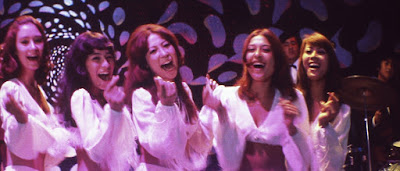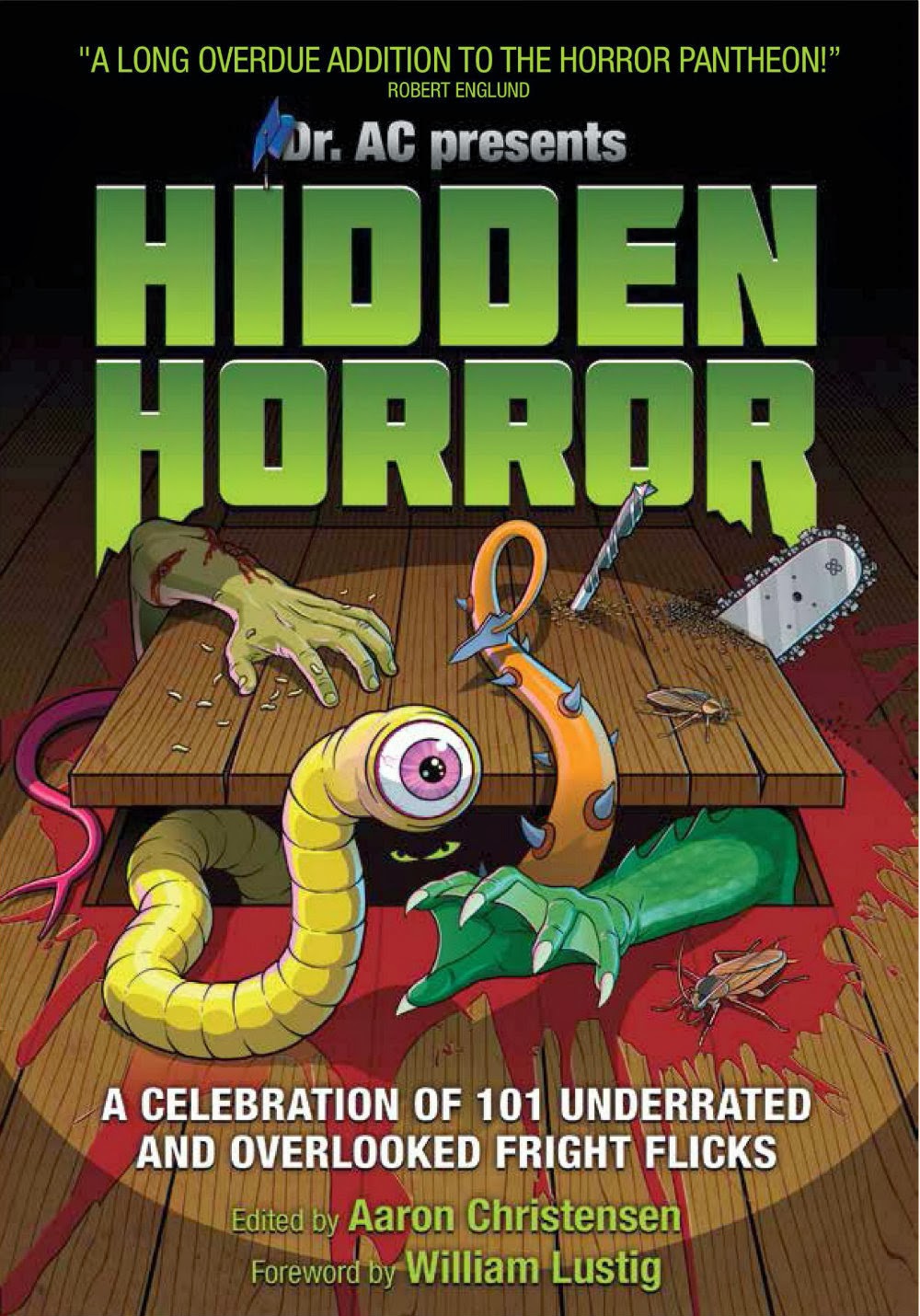Tuesday, July 7, 2015
PIT STOP, STRAY CAT ROCK and CEMETERY WITHOUT CROSSES Blu-ray Reviews
If there’s one thing I recognize from exploring the horror genre over the past 15 years, subjecting myself to everything from the slickest Hollywood remake to the barest-of-bones backyard indie feature, it’s that my appreciation and/or tolerance for weird and wild cinema has deepened and grown. Where once poor dubbing, acting, or penniless production value would have instantly turned me off of a film, I now find myself able to gaze into the abyss for hours at a time; similarly, bizarre aesthetics and unconventional narratives are no longer received with frustration, but with the excitement of a new, fresh taste for my cinematic palate. Not to say I love everything I encounter, but these days, I’m far more likely to remember and appreciate that which is foreign to my sensibilities as opposed to any highly processed computer-generated, star-powered multiplex fare.
All of which leads me to this month’s releases from Arrow Video, which has not only dazzled me with its recent souped-up high-def horror releases of The Happiness of the Katakuris and Contamination, but also with a trio of “civilian” offerings that, as with their April slate, were completely new to my relatively versed mind and eyes. The fact that I’d never even heard of any of them instantly conjured images of those early Foolish years where I offered myself up to whatever the local late-night independent television programmers had to offer. From Hong Kong kung-fu flicks to down-and-dirty action pieces to trashy monster movies, it was all new to me, and now, Arrow brings back that sense of uncharted excitement and adventure with exploitation king Jack Hill’s rarely-seen stock car melodrama Pit Stop, Frenchman Robert Hossein’s western Cemetery Without Crosses, and the Japanese “counterculture-biker-chick-juvenile-delinquent-pinky-violence” mash-up that is the five-film Stray Cat Rock series.
Pit Stop (1969) d. Jack Hill (USA)
Street-racing greaser Rick Bowman (Richard Davalos) is bailed out of jail by slimy race promoter Grant Willard (Brian Donlevy in his final screen appearance), who then lures him into participating in the devious and deadly sport of figure-8 stock car racing. Pitted head-to-head against the “dingie” reigning champ Hawk Sidney (Sid Haig), Rick finds that he has the skill and the ruthlessness to win, but at what cost? His life? His soul?
Filmed on a real figure-8 track in “Crash-o-Rama,” Hill and his small crew captured all the visceral racing scenes over five nights, and then paired up vehicles that matched the particularly spectacular devastating crashes. The stellar cast also features Haig’s Spider Baby co-star Beverly Washburn and a young actress named “Ellen McRae,” soon to be known as Oscar-winning actress Ellen Burstyn. Filmed in stark black-and-white in order to shoot at night with minimal lighting, this is a blistering morality tale packed with plenty of vehicular carnage and a killer downbeat ending. The new High Definition digital transfer, supervised and approved by Hill, will likely be most viewers first exposure to the film, and as the “Restoring Pit Stop” featurette with technical supervisor James White amply demonstrates, it’s likely Pit Stop hasn’t looked this good since it first rolled out of the chemical baths in the late 60s.
Arrow’s extras-laden presentation makes it all the easier to appreciate this lost gem, starting off with the newly recorded audio commentary featuring the writer/director sharing the mike with genre specialist and Hill biographer Calum Waddell. It’s the kind of enthusiastic and knowledgeable track that represent the Platonic ideal of the form, as we (and occasionally Hill and Waddell) learn oodles of background intel over the course of the 90-minute run time. Tidbits include the fact that the original title, “The Winner,” was canned because Paul Newman’s racing pic Winning had already been announced, and while Pit Stop didn’t blow the doors off the drive-in circuit, it did make a big enough impression on a certain Mexican producer to land Hill the gig of shooting the L.A.-based scenes for Boris Karloff’s final four films (Fear Chamber, House of Evil, Isle of the Snake People, Alien Terror).
The disc also sports a trio of marvelous and engaging Waddell-produced featurettes: “Crash and Burn!” with Hill (15 min), “Drive Hard” with Haig (17 min), and “Life in the Fast Lane” with Roger Corman (11 min), who offered Hill the small $75,000 budget to make the film almost entirely on his own terms. It’s also worth noting that since this release was originally produced for the UK market, that the subtitles still contain several European spellings (tyres, chequerboard). A reversible sleeve, featuring original and newly commissioned artwork by Jay Shaw, rounds out the literal package, with a collector's booklet featuring new writing on the film by critic Glenn Kenny and musicologist and writer Gray Newell on the film's soundtrack, illustrated with original stills and artwork.
http://mvdb2b.com/s/PitStop2DiscDirectorApprovedEditionBluRayDVD/AV016
Stray Cat Rock: Delinquent Girl Boss (1970) d. Yasuharu Hasebe (Japan)
Stray Cat Rock: Wild Jumbo (1970) d. Toshiya Fujita (Japan)
Stray Cat Rock: Sex Hunter (1970) d. Yasuharu Hasebe (Japan)
Stray Cat Rock: Machine Animal (1970) d. Yasuharu Hasebe (Japan)
Stray Cat Rock: Beat ’71 (1971) d. Toshiya Fujita (Japan)
These five tales of rebellious youth are all over the map in terms of subject matter and tone, their only real connecting thread being the SCR title and actress Meiko Kaji (Lady Snowblood, Blind Woman's Curse), who swings from supporting to lead roles throughout. Our first film, Delinquent Girl Boss, sees a girl gang led by real-life recording artist Akiko Wada going up against other street gangs and the nefarious yukuza Seiyu Group. Wild Jumbo sees a band of petty hoodlums turning revolutionary and targeting a religious organization for their ill-gotten gains. Sex Hunter swings to racial prejudices against the backdrop of two warring gangs (one led by Kaji), while Machine Animal follows a package of 500 LSD tabs being peddled by a Japanese trio looking to emigrate to Sweden much to the consternation of the local yakuza. Finally, Beat ’71 sends up the hippie culture in a story of haves and have-nots that climaxes with a bloody gunfight in a deserted tourist mining town.
With genre veterans Hasebe (Massacre Gun) and Fujita (Lady Snowblood) at the helm, this quintet of films showcased a psychedelic mix of girl gangs, bikers, sex, drugs, and rock and roll with plenty of ass-kicking to boot, all captured in a delirious mash-up of pop aesthetics including split screens, freeze frames, injections of color, frenetic editing and dizzying angles. Oddly enough, however, all of the films suffer from pacing issues and feel overlong even though each clocks in at less than 90 minutes. The characters are almost universally thin and generally unpleasant, and the stories all conclude on invariably bleak notes. What seems like ought to be a series of fun and wacky teen thrill rides is only occasionally wacky and even more rarely fun. (Basically, anytime someone decides to chase someone else in a motor vehicle, you’re in for a good time. Outside of that… not so much. Rape parties, anyone?)
If I had to pick a favorite, I’d probably go for either Delinquent Girl Boss or Beat ’71, although Sex Hunter seems to be widely accepted as the best of the bunch. (Then again, this could be due to the fact that prior to this release, it was the only one widely available with English subtitles.) However, there’s no quibbling about the quality of the films’ various and eclectic soundtracks, all of which are great fun and belie the darker subject matters cloaked within their bouncy melodies.
Even if it's not necessarily my cuppa green tea, Arrow has done U.S. fans of Asian cinema a great service by releasing this limited edition 3000-unit collection (previously released in the UK last fall), complete with brand new English subtitles for all five films. While the package doesn’t contain the usual abundance of per-film extras the company is known for, there are three 30-minute interviews that more than make up the difference. These include Hasebe (director of Delinquent Girl Boss, Sex Hunter and Machine Animal), actor Tatsuya Fuji (who, like Kaji, appears in every entry in the series), and Yoshio Harada, the star of Beat '71. The various films’ original trailers and a collector's booklet featuring new writing on the films by Japanese cinema expert Jasper Sharp, complete the package.
http://mvdb2b.com/s/StrayCatRockTheCollectionBlurayDVD/AV008
Cemetery Without Crosses (1969) d. Robert Hossein (France/Italy/Spain)
After her husband is lynched by bandits, Maria Caine (Michèle Mercier) seeks revenge and turns to an old friend, Manuel (played by director Hossein), for help. The initially reluctant Manuel, a mysterious loner who lives in a ghost town and dons a single black glove before each gunfight, soon infiltrates the widow's enemies to force a showdown.
Inspired by the international success of his great friend Sergio Leone’s Dollars trilogy, Rififi star Hossein decided to fulfill his long-held dream of playing gunslinger, crafting this haunting piece that dances the line between the audacious lyricism of the spaghetti westerns with the hard-bitten reality of Anthony Mann’s entries to the genre. Mercier, star of “The Telephone” segment in Mario Bava’s Black Sabbath, is absolutely stunning as the fiery widow, and Hossein is marvelously rugged and weathered as her reluctant instrument of revenge. While there are no shortages of showdowns in dusty streets or crowded saloons, this is a bleaker and more melancholy offering that you might be used to. The thundering, Morricone-esque score is courtesy of composer Andre Hossein (the director/star’s father), with the memorable main themes sung by famed 60s recording artist Scott Walker (of The Walker Brothers).
Arrow unveils this rarely seen oater with a brand new 2K restoration from the original film elements, and original Italian and English soundtracks in uncompressed PCM mono audio (with newly translated English subtitles for the Italian soundtrack). The extras aren’t quite as impressive for this particular feature, with only a few brief featurettes to provide context for fullest appreciation. The first, an all-new interview with Hossein entitled “Remembering Sergio,” seems particularly egregious in its brevity, clocking in at a mere five minutes, especially since it would appear that the director has plenty more stories to offer.
More enlightening is an 8-minute French television news report on the film's making, containing interviews with Hossein, Mercier, and Serge Marquand, padded out by another short archival interview with the director. It’s a rare instance of stinginess from the company renowned for its supplemental extravagance, but the reversible sleeve, featuring original and newly commissioned artwork by James Flames, and liner notes containing new writing by Ginette Vincendeau and Rob Young will hopefully make up the difference.
http://mvdb2b.com/s/CemeteryWithoutCrossesBlurayDVD/AV014
Pit Stop, Stray Cat Rock, and Cemetery Without Crosses are available for pre-order from Arrow Video – stop by MVD Entertainment to reserve your copy today!
.
Subscribe to:
Post Comments (Atom)




























No comments:
Post a Comment